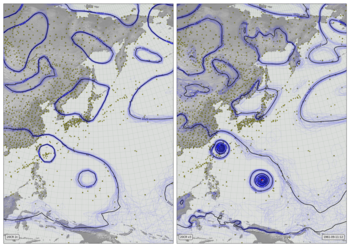Stripes plotting code¶
Plot the slices for ensemble member 1:
#!/usr/bin/env python
# 20CRv3 stripes.
# Monthly, resolved in latitude, averaging in longitude,
# single ensemble member.
import os
import iris
import numpy
import datetime
import pickle
import matplotlib
from matplotlib.backends.backend_agg import FigureCanvasAgg as FigureCanvas
from matplotlib.figure import Figure
from matplotlib.patches import Rectangle
from matplotlib.lines import Line2D
start=datetime.datetime(1806,1,1,0,0)
end=datetime.datetime(2015,12,31,23,59)
from get_sample import get_sample_cube
# Cache the climatology to speed things up
cpkl="%s/20CR/version_3/monthly_means/PRATE.climatology.1961-90.pkl" % os.getenv('SCRATCH')
if os.path.exists(cpkl):
climatology=pickle.load(open(cpkl,'rb'))
else:
climatology=[]
e=[]
for year in range(1961,1990):
h = None
for member in range(1,81):
f=iris.load_cube(('%s/20CR/version_3/monthly_means/%04d/'+
'PRATE.%04d.mnmean_mem%03d.nc') %
(os.getenv('SCRATCH'),year,year,member),
iris.Constraint(name='Precipitation rate'))
if h is None:
h=f
else:
h.data += f.data
h.data /= 80
h.attributes=None
e.append(h)
e=iris.cube.CubeList(e).concatenate_cube()
for month in range(1,13):
m=e.extract(iris.Constraint(time=lambda cell: cell.point.month == month))
climatology.append(m.collapsed('time', iris.analysis.MEAN))
pickle.dump(climatology,open(cpkl,'wb'))
# Cache the sample so we can tinker rapidly with the plot
cspf='sample.pkl'
if os.path.exists(cspf):
(ndata,dts)=pickle.load(open(cspf,'rb'))
else:
# Process in batches or we'll run out of memory.
rst = numpy.random.RandomState(seed=None)
dts=[]
ndata=None
for year in range(start.year,end.year+1,1):
ey = min(year+1,end.year)
(ndyr,dtyr) = get_sample_cube(datetime.datetime(year,1,1,0,0),
datetime.datetime(year,12,31,23,59),
climatology=climatology,
new_grid=climatology[0],rstate=rst)
dts.extend(dtyr)
if ndata is None:
ndata = ndyr
else:
ndata = numpy.ma.concatenate((ndata,ndyr))
pickle.dump((ndata,dts),open(cspf,'wb'))
# Plot the resulting array as a 2d colourmap
fig=Figure(figsize=(19.2,6), # Width, Height (inches)
dpi=300,
facecolor=(0.5,0.5,0.5,1),
edgecolor=None,
linewidth=0.0,
frameon=False,
subplotpars=None,
tight_layout=None)
canvas=FigureCanvas(fig)
matplotlib.rc('image',aspect='auto')
# Add a textured grey background
s=(2000,600)
ax2 = fig.add_axes([0.02,0.05,0.98,0.95],facecolor='green')
ax2.set_axis_off()
nd2=numpy.random.rand(s[1],s[0])
clrs=[]
for shade in numpy.linspace(.42+.01,.36+.01):
clrs.append((shade,shade,shade,1))
y = numpy.linspace(0,1,s[1])
x = numpy.linspace(0,1,s[0])
img = ax2.pcolormesh(x,y,nd2,
cmap=matplotlib.colors.ListedColormap(clrs),
alpha=1.0,
shading='gouraud',
zorder=10)
# Plot the stripes
ax = fig.add_axes([0.02,0.05,0.98,0.95],facecolor='black',
xlim=((start+datetime.timedelta(days=1)).timestamp(),
(end-datetime.timedelta(days=1)).timestamp()),
ylim=(1,0))
ax.set_axis_off()
ndata=numpy.transpose(ndata)
s=ndata.shape
y = numpy.linspace(0,1,s[0]+1)
x = [(a-datetime.timedelta(days=15)).timestamp() for a in dts]
x.append((dts[-1]+datetime.timedelta(days=15)).timestamp())
img = ax.pcolorfast(x,y,numpy.cbrt(ndata),
cmap='BrBG',
alpha=1.0,
vmin=-0.025,
vmax=0.025,
zorder=100)
# Add a latitude grid
axg = fig.add_axes([0.0,0.05,1,0.95],facecolor='green',
xlim=((start+datetime.timedelta(days=1)).timestamp(),
(end-datetime.timedelta(days=1)).timestamp()),
ylim=(0,1))
axg.set_axis_off()
def add_latline(ax,latitude):
latl = (latitude+90)/180
startt=start.timestamp()+(end.timestamp()-start.timestamp())*0.019
ax.add_line(Line2D([startt,end.timestamp()],
[latl,latl],
linewidth=0.75,
color=(0.2,0.2,0.2,1),
zorder=200))
tx=start.timestamp()+(end.timestamp()-start.timestamp())*0.018
ax.text(tx,latl,
"%d" % latitude,
horizontalalignment='right',
verticalalignment='center',
color='black',
size=14,
clip_on=True,
zorder=200)
for lat in (-60,-30,0,30,60):
add_latline(axg,lat)
# Add a date grid
axg = fig.add_axes([0.02,0,0.98,1],facecolor='green',
xlim=((start+datetime.timedelta(days=1)).timestamp(),
(end-datetime.timedelta(days=1)).timestamp()),
ylim=(0,1))
axg.set_axis_off()
def add_dateline(ax,year):
x = datetime.datetime(year,1,1,0,0).timestamp()
ax.add_line(Line2D([x,x], [0.04,1.0],
linewidth=0.75,
color=(0.2,0.2,0.2,1),
zorder=200))
ax.text(x,0.024,
"%04d" % year,
horizontalalignment='center',
verticalalignment='center',
color='black',
size=14,
clip_on=True,
zorder=200)
for year in range(1810,2020,10):
add_dateline(axg,year)
fig.savefig('PRATE.png')
